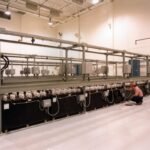Sustainable Aviation Fuel: Transforming Air Travel and Combating Climate Change
In November 2023, sustainable aviation fuel (SAF) made from used cooking oil and waste animal fats powered the first-ever commercial flights. Virgin Atlantic Flight100 from London to New York City and an Emirates A380 demonstration flight successfully utilized SAF produced by Finnish company Neste. Neste operates the world’s largest SAF refinery in Tuas, Singapore, making it a key player in shaping the future of air travel.
To gain deeper insights into Neste’s SAF production process and its impact on aviation and climate change, I interviewed Sami Jauhiainen, Neste’s Vice President of Renewable Aviation. Jauhiainen emphasized the need for the aviation industry to take responsibility for its emissions while acknowledging the irreplaceable benefits it brings to businesses and society.
Commercial aviation accounts for 2.5% of global CO2 emissions, according to a recent study. However, using SAF can reduce lifecycle greenhouse gas emissions by up to 80% compared to conventional fossil jet fuel. As the largest producer of SAF in the world, Neste aims to lead by example by continuously informing stakeholders, including airlines, airports, governments, businesses, and individual travelers, about the importance of SAF for aviation and combating climate change.
Neste’s SAF production begins with sourcing used cooking oil and waste animal fats from around the globe, which are then transported to Singapore by ship. Through a pre-treatment process and NEXBTL technology, Neste converts these fats and oils into the final product, Neste MY Sustainable Aviation Fuel. While the current ASTM standards allow a maximum of 50% SAF blend with conventional jet fuel, test flights have demonstrated the safety of running on 100% SAF.
Scaling up SAF Production
Currently, SAF constitutes only 0.2% of all jet fuel consumption. However, with increasing government support and voluntary demand, Jauhiainen expects global SAF demand to reach approximately 15 million tons by 2030. To meet this demand, Neste has opened an APAC Innovation Center in Singapore to enhance its global capabilities in innovation, research, and development.
Neste’s existing refinery in Singapore, the world’s largest SAF production facility, is undergoing expansion to increase its production capacity. With an annual output of 1 million tons, Neste’s renewable refinery in The Netherlands is also expected to expand, reaching a capacity of 2.2 million tons by 2026.
Singapore: A Strategic Location for SAF
Singapore’s selection as the host for Neste’s largest SAF refinery showcases its connectivity and status as a major aviation hub in the Asia-Pacific region. The availability of sourcing materials by sea and the potential demand at Changi Airport make Singapore an ideal location to accelerate the adoption of SAF.
Several developments in Singapore highlight its commitment to sustainable aviation:
- In May 2023, Neste announced an integrated supply chain linking the refinery directly to Singapore’s Changi Airport.
- Singapore Airlines and its subsidiary Scoot conducted a successful 20-month trial using SAF provided by Neste, indicating their readiness to incorporate renewable fuel into their mix.
- Neste has supplied renewable fuel to over 70 customers globally, including major carriers like United Airlines, Air France-KLM, and All Nippon Airways.
- The Association of Asia-Pacific Airlines (AAPA), including Singapore Airlines, pledged to use up to 5% SAF by 2030.
- In 2024, Singapore plans to launch the Singapore Sustainable Hub Blueprint, further bolstering the market for SAF.
The transition to SAF will have a positive impact on the future of air travel. For Jauhiainen, the motivation goes beyond business reasons. As a father of three young children, he strongly believes in taking action to create a healthier planet for future generations. Working at Neste has provided him with a clear purpose, as he collaborates with colleagues committed to the same cause.
Learn more about why so many are partnering with Singapore to drive meaningful change.
This post was created by Insider Studios with the Singapore Economic Development Board.



